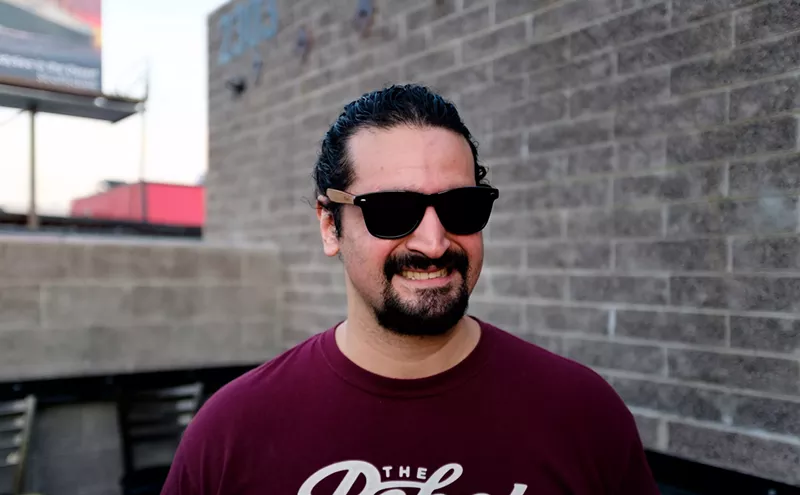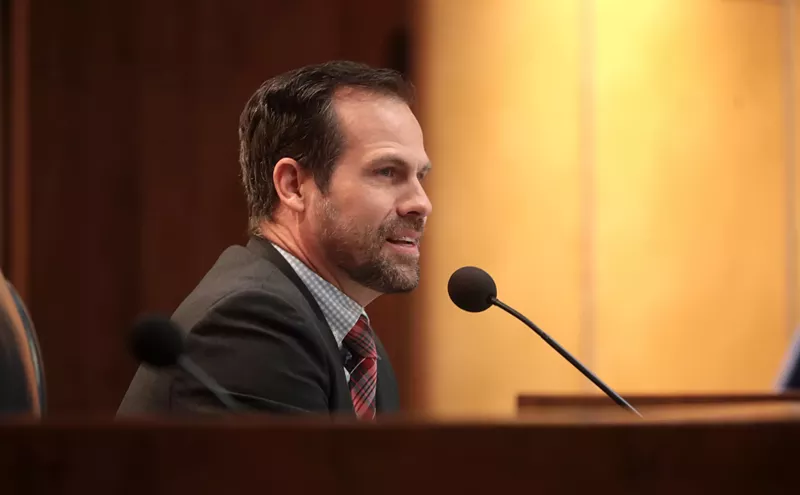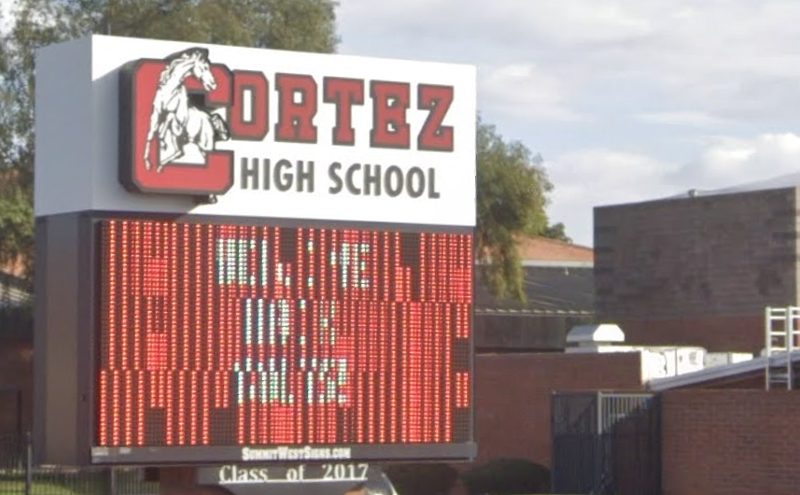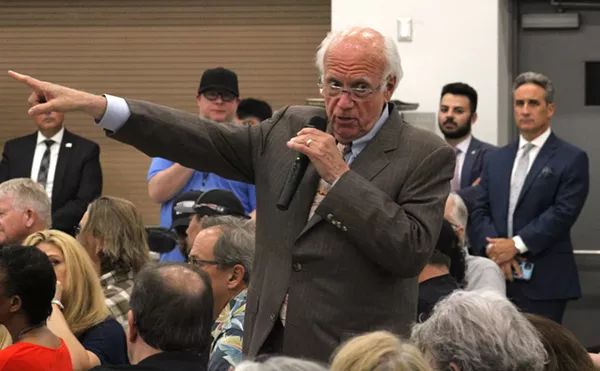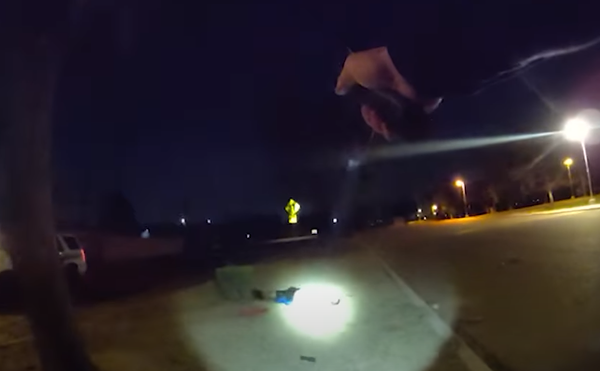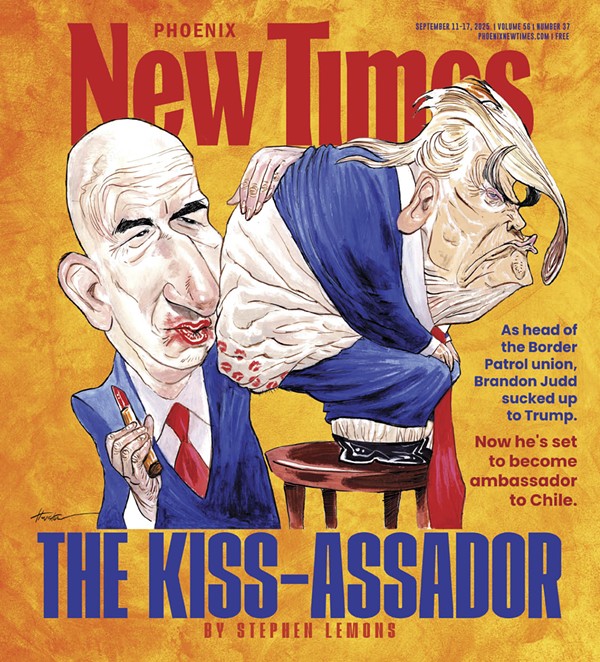And Thomas and Arpaio are using taxpayer funds to accomplish their skullduggery.
The primary financial beneficiary is Phoenix law firm Wilenchik & Bartness, which has been paid more than $326,000 for legal work on behalf of the county in the past year.
As I reported two weeks ago ("Doubting Thomas," June 15), Thomas briefly worked for the firm headed by Dennis Wilenchik during the crucial nine months leading up to his election in November 2004.
Both Thomas and Wilenchik continue to refuse to publicly disclose what work Thomas did for the firm during this period and how much he was paid.
But what we do know is that Wilenchik has assisted Thomas in raising money for his campaign. Campaign finance reports state that Wilenchik contributed $350 in April 2004 to Thomas' campaign at the same time Thomas was one of his employees.
More recently, Wilenchik has been actively involved in raising money for Thomas' 2008 reelection campaign. Wilenchik is listed as a member of the "host committee" for an April 22 fund raiser that asked guests for a minimum $200 contribution. Arpaio is also listed as one of the members of the host committee.
Wilenchik and Thomas' refusal to disclose the financial details of Thomas' brief tenure at Wilenchik & Bartness, combined with Wilenchik's direct financial support for Thomas' campaigns, raises a huge red flag.
Their stonewalling is further bolstering my already strong suspicion that Thomas was receiving a fat salary in exchange for little work during the months leading up to his election, which, if true, would constitute an unlawful campaign contribution.
Wilenchik's legal work for the county, which began five months after Thomas took office in January 2005, and his and the county attorney's refusal to disclose details of Thomas' employment, makes me wonder what they are hiding.
The most important case that Thomas has awarded to Wilenchik is defending the Maricopa County Sheriff's Office in a lawsuit filed by the most potent political rival to Arpaio in years, Buckeye Police Chief Dan Saban, formerly a Mesa Police Department commander.
Wilenchik's work on this case has opened the door to more lucrative opportunities of representing the MCSO in most, if not all, of the current civil issues it faces under Arpaio. The 74-year-old sheriff has generated an avalanche of lawsuits resulting from his officers' abuse of inmates and detainees during his 14 years as the county's top law enforcement officer, and a rich vein of new lawsuits is virtually guaranteed.
Saban's suit alleges that Arpaio and chief deputy David Hendershott abused their police powers and improperly influenced the outcome of an election by launching a groundless criminal investigation in April 2004 into Saban's alleged past and then leaking dubious allegations of sexual misconduct to the media.
The MCSO criminal investigation began after Saban's foster mother, Ruby Norman, alleged that Saban had sexually assaulted her 32 years earlier while he was a teenager. The woman had never before contacted police about the would-be assault, and the timing of her complaint during the middle of Saban's political campaign should have raised suspicions about her motivation.
At the very least, the MCSO should have immediately referred the case to another police agency since it involved one of Arpaio's political rivals.
Instead, Hendershott conducted at 15-minute phone interview and then sent detectives to conduct a second round of questioning. MCSO detectives immediately prepared a report — which normally takes weeks — and a copy was given to a friendly reporter at a Phoenix television station who had earlier paid $100 to attend an Arpaio fund-raising dinner.
The station, KNXV-TV Channel 15, rushed to broadcast the story with the sensational news hook that Saban was under criminal investigation for sexual assault.
With its objective of smearing Saban accomplished, the MCSO then referred the case to Pima County for further investigation. Pima County investigators dropped the matter because the statute of limitations had expired decades earlier and, most important, because there was insufficient evidence to support the claim. Saban repeatedly denied the allegations.
Hendershott and Arpaio's gambit inflicted serious damage to Saban's grassroots campaign that was struggling to gain traction against Arpaio's ruthless media machine that has turned the John Wayne wanna-be into an international celebrity.
Despite the negative publicity, Saban continued to gain momentum throughout the summer of 2004, especially after he received an endorsement from Senator John McCain.
Arpaio held on to defeat Saban by 10 percentage points in the September 2004 Republican primary. It was the closest election Arpaio has faced since he was first elected sheriff in 1992.
Saban filed his lawsuit in May 2005, and it has quietly become a high-stakes showdown between the paranoid Arpaio and the swashbuckling Saban.
Saban's lawyers have alleged in pleadings that "the reprehensible behavior in this case is due to Deputy Chief Hendershott's past criminal behavior and his need for Sheriff Arpaio to remain in power."
The suit alleges that Hendershott "has misappropriate[d] monies, destroyed evidence, intimidated witnesses, and falsified records, for his personal and pecuniary gain as well as Arpaio's."
The suit contends that details of Hendershott's alleged illicit activities would have come to light if Saban, who enjoyed the backing of nearly every law enforcement organization in the state, as well as the Maricopa County Republican Party, had won the election.
Therefore, the suit alleges, Hendershott was willing to do anything to destroy Saban's campaign. Naturally, Hendershott, Arpaio and the other defendants deny they did anything wrong in their handling of the Saban criminal investigation.
Thomas appointed his old boss, Wilenchik, to defend the sheriff's office in Saban's suit last July 27. Up to this point, as far as I can tell, mold-contamination cases were Wilenchik's legal bread and butter.
A key plank of Wilenchik's defense strategy has been to gather massive amounts of personal and professional information on Saban, data that most certainly would be used by Arpaio in the 2008 election campaign when Saban is expected to again challenge Arpaio.
"They are just trying to harass him and bully him," growls Aaron Goodman, an attorney with the Phoenix law firm Robbins & Curtin, which is representing Saban in the suit. "I'm sure they will use the information as ammunition . . . in the next election."
Goodman says Wilenchik has spared no expense in obtaining a detailed array of records on Saban, most of which have nothing to do with the merits of the suit.
"Everything that could be gotten on Dan Saban has been gotten," Goodman tells me.
Wilenchik has obtained Saban's employment applications and personnel files from the Mesa Police Department, from which Saban retired before running for sheriff. Wilenchik is also gathering information from the Buckeye Police Department on Saban, even though Saban took the job in Buckeye long after the events that triggered the suit.
Goodman says Wilenchik has gathered Saban's bank records, tax returns, real estate records (including deeds of trust), records related to changing his name, his divorce records, and copies of a polygraph Saban took before being named Buckeye police chief.
Not surprisingly, the sheriff's office says it's delighted with Wilenchik's fishing expedition and has requested that Thomas appoint Wilenchik to represent the MCSO in all future cases. Hendershott even went so far as to write a very unusual letter praising Wilenchik's performance.
"I haven't written a letter complimenting a lawyer before, but I thought it's important to let you know how pleased the sheriff and I have been with Dennis Wilenchik's representation of our office," Hendershott states in a February 1 letter to deputy county attorney Chris Keller.
In the letter, Hendershott asks the County Attorney's Office to allow Wilenchik to represent the sheriff's office in all legal matters.
"We believe consolidation of work with such an aggressive, highly qualified attorney makes sense," Hendershott states.
Hendershott's letter, of course, provides political cover for Thomas.
Rather than being subjected to criticism for steering so much business to his former boss, Thomas' spin doctors claim that the primary reason his old law firm is getting so much work from the county is because Arpaio and Hendershott are demanding that Wilenchik represent the MCSO.
Neither Thomas nor Wilenchik has personally responded to my repeated requests for an interview. But Wilenchik did have time to prepare a four-page, single-spaced letter to the editor demanding corrections and retractions to my June 15 column that first exposed the $326,000 in county payments to Wilenchik & Bartness.
Rather than sending the letter directly to New Times, Wilenchik first provided a copy to a Phoenix television news station that was considering doing a story on the matter. His attempt was to defuse my story. (The full text of Wilenchik's letter can be viewed by clicking below the image to the right of this column.)
In this June 14 missive, Wilenchik states that my column "was factually wrong and slanted in most respects."
He took particular issue with my statement that he is a "prominent Republican activist." Wilenchik writes that he is "neither an activist on any issue I am aware of, nor prominent in the Party at all."
But in the very next sentence, Wilenchik acknowledges that he is a "proud Republican Precinct Committeeman," which demonstrates that he is very active in party politics.
While Wilenchik never quibbled over the fact that his firm has received $326,000 in payments from the county for legal work since his old employee, Andy Thomas, got elected county attorney, he was livid because I didn't mention that his firm was handling one of the cases for free.
Thomas sued the Maricopa County Superior Court earlier this year to try to stop it from conducting post-DUI rehabilitative hearings in Spanish and Native American languages. Wilenchik says he was brought into the case to represent several victims of felony DUI offenders. Wilenchik states that his firm is doing this "at no charge or cost whatsoever" to the county and that he is "proud of our involvement on behalf of these victims."
I sent Wilenchik an e-mail last week asking him a number of questions, including the circumstances that led him to represent the DUI victims "pro bono." He didn't respond, just like he didn't respond when I was preparing my earlier column on the business Thomas has siphoned his way.
But I'll offer one theory: If Andy Thomas had just steered more than $300K into my firm's safe, it certainly would be prudent to kick in a freebie to help Thomas with his politically motivated suit against the Superior Court. For those of you who haven't followed Andy's exploits, he ran for county attorney on an anti-illegal-immigration platform. That the issue should have nothing to do with prosecuting criminal cases in Maricopa County was irrelevant to him and apparently to voters. He has continued to bash Mexicans since. The DUI courts issue is but one example of his race-baiting philosophy.
Wilenchik's letter claims there is nothing afoul about Thomas' working for the law firm in the nine months prior to the election and then, upon winning office, showering his former boss with legal work representing the county.
"There was no 'quid pro quo' related to his being elected at all," Wilenchik states.
If that's the case, then why not disclose Thomas' billable hours, his pay, and examples of pleadings or depositions he conducted while employed with the firm? What's the big deal about that, if, in fact, such tangible work product actually exists?
Wilenchik states in his letter that such information can't be released because it would violate attorney-client privilege. Only the clients, Wilenchik states, could waive that privilege.
"I can assure your readers that Mr. Thomas was indeed employed by our firm as a regular billing attorney and that he handled various large cases involving claims against homebuilders here and in Tucson while employed at my firm," Wilenchik states.
Well, then, Mr. Wilenchik, simply ask the clients to waive their privilege and disclose who Thomas worked for, how much he was paid and how many hours he worked on the cases. Or delete the names of the clients on any documents you provide me and list the billable hours and their dates.
Until Wilenchik and Thomas come clean, the unsavory appearance remains that Wilenchik provided Thomas a cushy job and a fat salary so that he could keep his wife and four kids in clover at the same time he was focused on running a complex political campaign. And that, once elected, Thomas returned the favor by steering lucrative county contracts to Wilenchik.



